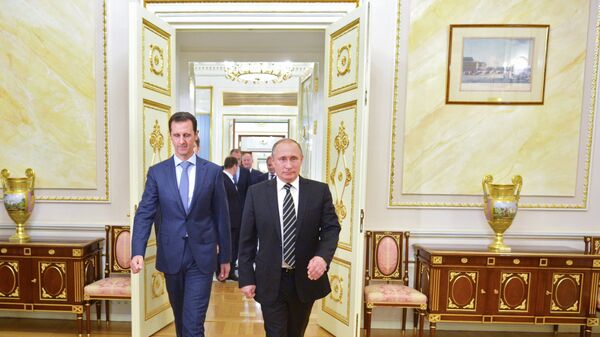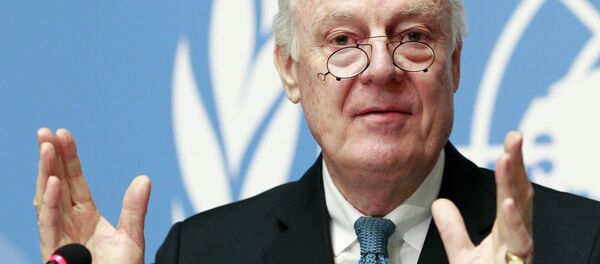WASHINGTON (Sputnik) — Syrian President Bashar Assad’s visit to Moscow and talks with Russian President Vladimir Putin opens the way at last for a negotiated political solution to the Syrian civil war, US experts told Sputnik.
“There has always been, through the UN-sponsored Geneva process, a good opportunity to resolve Syria's crisis through diplomacy and negotiation,” Helena Cobban, author of two books on the geopolitics of Syria, told Sputnik on Wednesday.
Previously, that road to a compromise solution was blocked by the Obama administration’s insistence that Assad must be toppled from power first, Cobban recalled.
If the international community had insisted on toppling President Frederik de Klerk before starting any meaningful negotiation, “We would still have apartheid and war in South Africa today,” she noted.
Cobban pointed out that Assad continues to hold strong support among ordinary Syrians.
The Syrian elements supported by Washington, Cobban added, revealed themselves to be even weaker and more factionalized than the conventional wisdom in the US capital had previously allowed.
“[A]t least now, after the two developments of the collapse of the Pentagon's arm-and-train program and the strengthening of the Russian and Iranian deployments in Syria, there is a new opportunity for negotiations. Most especially since Washington has eased up on its ‘Assad must go’ stance,” she stated.
Moscow has taken some steps to try and identify, work with and empower non-Ba’ath elements who can be involved in the negotiation, Cobban explained.
By contrast, “Washington has made so many attempts to put together a single, coherent ‘opposition coalition’, under various ever-changing names, that the situation would be hilarious if it were not so terribly tragic for Syria's people,” Cobban asserted.
Cobban also suggested that the United Nations could issue a call for a ceasefire followed by the Syrian government, the United States, Russia, Turkey, Jordan, and the European Union.
“To launch this process, UN Secretary General Ban [Ki-moon] should be encouraged to travel to Damascus, Amman and Ankara,” she concluded.
Colonel Doug Macgregor, a retired US Army combat officer, published author and expert on Middle East conflicts, suggested that Washington might adopt the ceasefire idea because the United States did not have any key interests at stake in the Syrian conflict.
“Washington has no strategy because its interests in the Sunni-Shia conflict are marginal at best. The Obama Administration’s current political goal is to be seen by campaign donors and voters as ‘engaged’ in the region at least through the presidential election,” Macgregor told Sputnik.
However, that level of interest did not translate into a tangible, concrete objective, let alone useful action, Macgregor noted.



